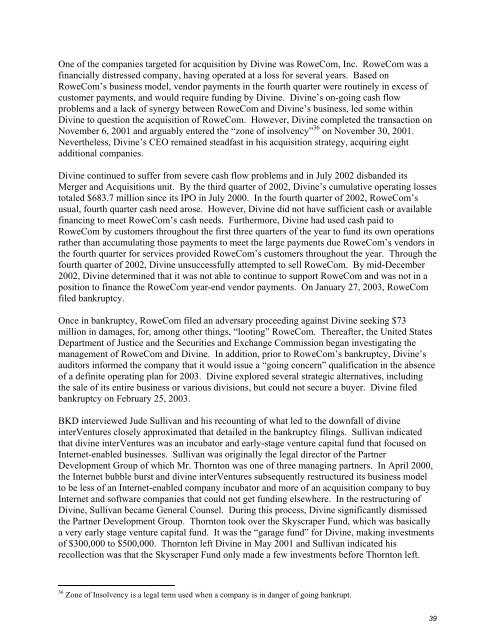Complete 2012 forensic audit documents - Kansas Bioscience ...
Complete 2012 forensic audit documents - Kansas Bioscience ...
Complete 2012 forensic audit documents - Kansas Bioscience ...
You also want an ePaper? Increase the reach of your titles
YUMPU automatically turns print PDFs into web optimized ePapers that Google loves.
One of the companies targeted for acquisition by Divine was RoweCom, Inc. RoweCom was a<br />
financially distressed company, having operated at a loss for several years. Based on<br />
RoweCom’s business model, vendor payments in the fourth quarter were routinely in excess of<br />
customer payments, and would require funding by Divine. Divine’s on-going cash flow<br />
problems and a lack of synergy between RoweCom and Divine’s business, led some within<br />
Divine to question the acquisition of RoweCom. However, Divine completed the transaction on<br />
November 6, 2001 and arguably entered the “zone of insolvency” 36 on November 30, 2001.<br />
Nevertheless, Divine’s CEO remained steadfast in his acquisition strategy, acquiring eight<br />
additional companies.<br />
Divine continued to suffer from severe cash flow problems and in July 2002 disbanded its<br />
Merger and Acquisitions unit. By the third quarter of 2002, Divine’s cumulative operating losses<br />
totaled $683.7 million since its IPO in July 2000. In the fourth quarter of 2002, RoweCom’s<br />
usual, fourth quarter cash need arose. However, Divine did not have sufficient cash or available<br />
financing to meet RoweCom’s cash needs. Furthermore, Divine had used cash paid to<br />
RoweCom by customers throughout the first three quarters of the year to fund its own operations<br />
rather than accumulating those payments to meet the large payments due RoweCom’s vendors in<br />
the fourth quarter for services provided RoweCom’s customers throughout the year. Through the<br />
fourth quarter of 2002, Divine unsuccessfully attempted to sell RoweCom. By mid-December<br />
2002, Divine determined that it was not able to continue to support RoweCom and was not in a<br />
position to finance the RoweCom year-end vendor payments. On January 27, 2003, RoweCom<br />
filed bankruptcy.<br />
Once in bankruptcy, RoweCom filed an adversary proceeding against Divine seeking $73<br />
million in damages, for, among other things, “looting” RoweCom. Thereafter, the United States<br />
Department of Justice and the Securities and Exchange Commission began investigating the<br />
management of RoweCom and Divine. In addition, prior to RoweCom’s bankruptcy, Divine’s<br />
<strong>audit</strong>ors informed the company that it would issue a “going concern” qualification in the absence<br />
of a definite operating plan for 2003. Divine explored several strategic alternatives, including<br />
the sale of its entire business or various divisions, but could not secure a buyer. Divine filed<br />
bankruptcy on February 25, 2003.<br />
BKD interviewed Jude Sullivan and his recounting of what led to the downfall of divine<br />
interVentures closely approximated that detailed in the bankruptcy filings. Sullivan indicated<br />
that divine interVentures was an incubator and early-stage venture capital fund that focused on<br />
Internet-enabled businesses. Sullivan was originally the legal director of the Partner<br />
Development Group of which Mr. Thornton was one of three managing partners. In April 2000,<br />
the Internet bubble burst and divine interVentures subsequently restructured its business model<br />
to be less of an Internet-enabled company incubator and more of an acquisition company to buy<br />
Internet and software companies that could not get funding elsewhere. In the restructuring of<br />
Divine, Sullivan became General Counsel. During this process, Divine significantly dismissed<br />
the Partner Development Group. Thornton took over the Skyscraper Fund, which was basically<br />
a very early stage venture capital fund. It was the “garage fund” for Divine, making investments<br />
of $300,000 to $500,000. Thornton left Divine in May 2001 and Sullivan indicated his<br />
recollection was that the Skyscraper Fund only made a few investments before Thornton left.<br />
36 Zone of Insolvency is a legal term used when a company is in danger of going bankrupt.<br />
39


